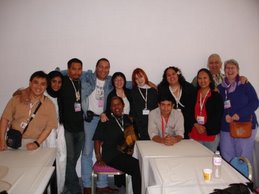23 April 2008
Economic and Social Council
HR/4947
Department of Public Information - News and Media Division - New York
Permanent Forum on Indigenous Issues
Seventh Session
5th Meeting (PM)
INDIGENOUS FORUM DISCUSSION FOCUSES ON PACIFIC REGION
Continuing its seventh annual session with a half-day discussion on the Pacific, delegates to the Permanent Forum on Indigenous Issues called for the Forum to take a more robust role in inducing other parts of the United Nations system to carry out mandates for securing the rights of the indigenous peoples in the region.
TEANAU TUIONO, Indigenous ICT Task Force, said improving “connectivity” among indigenous peoples was an urgent issue. At the same time, he warned against a tendency to label the exercise of legitimate political dissent by indigenous peoples as a form of terrorism. Recently, the Government of New Zealand had seized the server hosting the website of the Indigenous ICT Task Force. The homes of writers were raided under the pretext of anti-terrorism. Others were arrested at gunpoint, including one who was incarcerated for as long as a month. Household members were pinned to the ground with guns to their heads, including a 12 year-old girl. He said he himself had been separated from his partner and children and was detained, and his laptop confiscated.
He said the website was currently being hosted on a server run by indigenous people. Information and communication technology (ICT) was a powerful medium to support the work of indigenous peoples, and to facilitate the exchange of information. He recommended that the Forum speak out against Governments that used fear of terrorism as an excuse to prevent dissent over the Internet. In addition, the Forum should support indigenous ICT initiatives by allowing its logo to be used on his website. Indeed, ICT networks were a “necessity” for healthy societies.
Excerpt Source:
Economic and Social Council
HR/4947
Department of Public Information - News and Media Division - New York
Permanent Forum on Indigenous Issues
Seventh Session
5th Meeting (PM)
INDIGENOUS FORUM DISCUSSION FOCUSES ON PACIFIC REGION
Continuing its seventh annual session with a half-day discussion on the Pacific, delegates to the Permanent Forum on Indigenous Issues called for the Forum to take a more robust role in inducing other parts of the United Nations system to carry out mandates for securing the rights of the indigenous peoples in the region.
TEANAU TUIONO, Indigenous ICT Task Force, said improving “connectivity” among indigenous peoples was an urgent issue. At the same time, he warned against a tendency to label the exercise of legitimate political dissent by indigenous peoples as a form of terrorism. Recently, the Government of New Zealand had seized the server hosting the website of the Indigenous ICT Task Force. The homes of writers were raided under the pretext of anti-terrorism. Others were arrested at gunpoint, including one who was incarcerated for as long as a month. Household members were pinned to the ground with guns to their heads, including a 12 year-old girl. He said he himself had been separated from his partner and children and was detained, and his laptop confiscated.
He said the website was currently being hosted on a server run by indigenous people. Information and communication technology (ICT) was a powerful medium to support the work of indigenous peoples, and to facilitate the exchange of information. He recommended that the Forum speak out against Governments that used fear of terrorism as an excuse to prevent dissent over the Internet. In addition, the Forum should support indigenous ICT initiatives by allowing its logo to be used on his website. Indeed, ICT networks were a “necessity” for healthy societies.
Excerpt Source:



